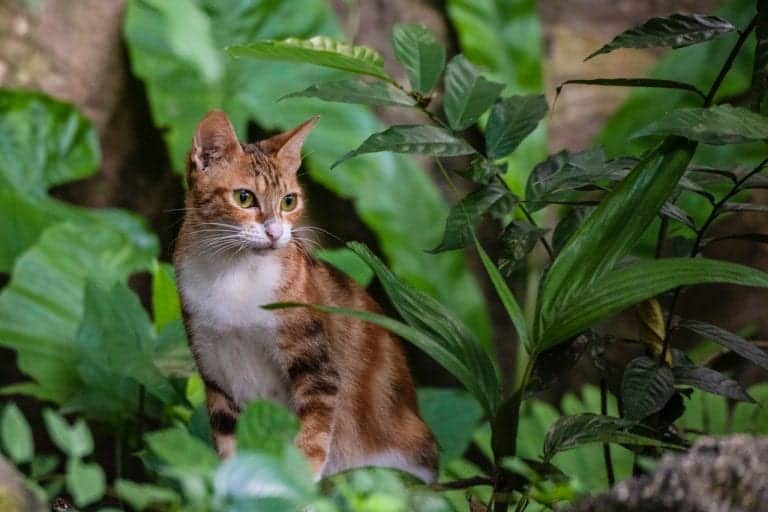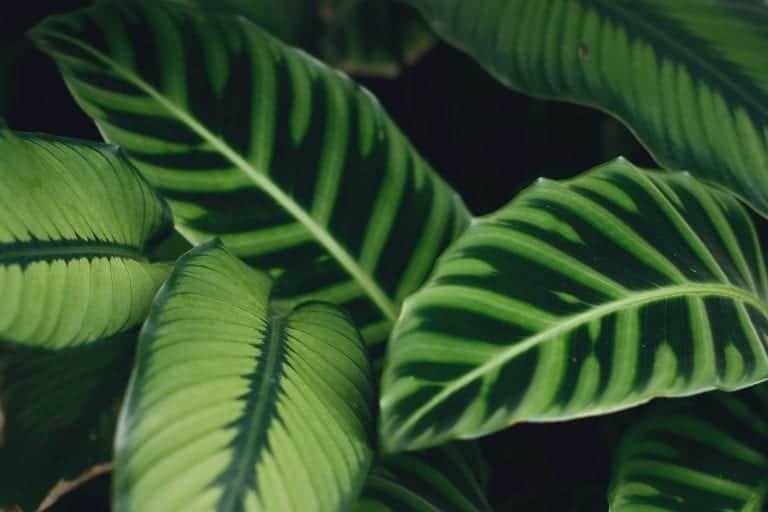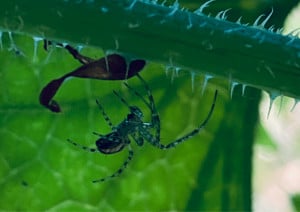Are Calathea Houseplants Poisonous To Cats? {SOLVED}
-
Chris Dosser
- August 8, 2022
If you buy something using the retail links in our articles, sometimes we earn a small affiliate commission. This does not impact the products we recommend.
None of the plant species within the Calathea (Goeppertia) family are poisonous to cats.
From the popular Calathea varieties such as Calathea zebrina and Calathea compact star through to the more unusual Calathea triostar none of them pose a threat to your precious feline friend.
This means that if you are a cat owner and work from home, it’s safe to introduce Calathea as an office plant and reap the benefits of working alongside houseplants at the same time as being surrounded by attractive evergreen foliage.
Whilst Calathea are a good choice of indoor plant to keep alongside cats, the same cannot be said for Rubber plants. Check out our guide that explores why rubber plants are toxic to cats.

Why are Calathea safe for cats?
Some houseplants are toxic to cats because their leaves, roots, flowers, stamen or pollen contain compounds (such as insoluble calcium oxalates) which when ingested can cause severe irritation and even major organ failure.
For particular houseplants or cut flowers even the water that surrounds their stems can become poisonous to cats!
Typically it is the grooming habits of cats which presents the greatest risk of them consuming toxins rather than your moggy nibbling or chewing upon foliage.
A cat unintentionally ingesting even a small amount of the wrong plant matter can cause complications. For example lilies are toxic to a point where even a cat cleaning lily pollen dusted upon its fur or whiskers can cause renal failure and death.
Fortunately however Calathea do not contain any such chemical compounds and are actually a source of nutrition for herbivores in their native surroundings.
Plants that are toxic to cats and similar in appearance to Calathea
Even browsing through the stores of professional plant sellers online I’ve come across mislabelled plants many times over.
Rarely are the misidentifications that wrong that they place the plant in an entirely different genus to it’s true lineage but it has happened before, and human error is a very real factor to consider when choosing your plants.
Normally this wouldn’t be too much of an issue but if the health of our beloved pets are at stake then it’s vitally important that we identify what plants are being brought into our homes and home offices
Toxic plants that could be said to be similar in appearance to Calathea are:
- Diffenbachia – Tropic Snow and Green Magic
- Croton plant – Petra
For reassurance we would recommend using PlantSnap, the free plant identifier app on Android and iOS to check whether your plant is in fact what it claims to be.
Alternatively here’s a rundown of Calathea ID and care needs from Planterina.
Are all types of Calathea safe for cats?
All species of Calathea are safe for cats and as cat owners ourselves this was some good news.
Native to the shady humid understories of South America forests, Calathea have been popular cultivars with plant breeders for many years. In fact the number of Calathea varieties is now estimated to be over 180!
This isn’t entirely a surprise given the stunning array of leaf shapes, myriad of bright bold patterns and enticing palette of colors that feature upon Calathea leaves and stems.
Their widespread popularity has also seen them become a staple with many online houseplant stores, and it’s pretty straightforward to get your hands on the common varieties such as Calathea compact star.

Chris Dosser
Co-Founder of Eden Indoors
Chris is a self-taught horticulturist with over a decade of experience caring for houseplants and creating lush, thriving indoor oases. He specializes in Monstera, and by self admission has a serious problem with buying and propagating rare indoor plants!
Similar Posts
Pruning Your Monstera Plant: Tips for Growth and Disease Prevention
Pruning your Monstera plant can be intimidating, but it's essential for its health and appearance. Follow these simple steps to keep your Monstera thriving.
Are Spiders Good For Houseplants? {ANSWERED}
If you find a spider has taken up residence in your houseplants, should you grab the bug spray or leave it to be a natural pest controller? Click here for recommendations.




